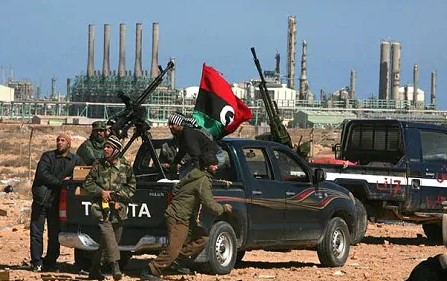
Libya’s oil production rebounded to around 1.25 million barrels a day after a major pipeline was fixed, while efforts continued to end a strike that could halt exports at three of the OPEC country’s ports.
Output at the Waha oil fields in eastern Libya has returned to a normal level of 300,000 barrels a day following the repairs, said Ali el-Farsi, a spokesman at Waha Oil Co., a subsidiary of the National Oil Corp. The 32-inch pipeline can carry around 200,000 barrels of oil each day to the nation’s biggest export terminal at Es Sider, which Waha Oil operates.
Despite the recovery, members of a paramilitary force known as the Petroleum Facilities Guard are threatening to stop shipments at Es Sider and two other terminals — Hariga and Ras Lanuf — in a dispute over unpaid salaries. Talks are underway between them and government officials to resolve the issue, people familiar with the situation said.
Libya’s Oil Network
OPEC nation has Africa’s biggest crude reserves
Source: U.S. Energy Information Administration
While strikes at Libya’s oil fields usually end quickly, the dispute underscores the fragility of the country’s energy industry after almost a decade of civil war and turmoil. U.S. ambassador Richard Norland met with NOC Chairman Mustafa Sanalla on Monday to “share concerns that a further shutdown of Libya’s energy sector would harm all Libyans,” the embassy said on Twitter.
The Libyan government has urged the ministry of defense to pay the striking PFG members, according to a letter seen by Bloomberg. The PFG was created to safeguard energy facilities amid the war.
The North African nation’s daily output surged from almost zero in early September after eastern-based forces ended a blockade of ports and fields. However, the dilapidated condition of oil infrastructure has made it difficult for the state energy firm to sustain the recovery. The labor dispute adds to the challenge.
Earlier this month, the PFG temporarily stopped a tanker from entering Hariga and gave the government an ultimatum to pay delayed salaries by Jan. 24.
Tankers Expected
Whether the guards’ action would actually disrupt shipments remains to be seen. The tanker Malibu, chartered by China-based Unipec, is currently at Hariga awaiting instructions to berth, according to a person familiar with the situation. Malibu is a Suezmax vessel scheduled to load 1 million barrels of crude for export to China.
The tanker Front Cruiser should be next to arrive at Hariga, on Jan. 30., the person said.
The Nevskiy Prospect is due at Ras Lanuf port on Jan. 29, while the Nordlotus and Seavelvet are to arrive at Es Sider from Jan. 28 to Jan. 31, according to the same person and Bloomberg shipping data.
Other PFG members threatened to shut the Zawiya refinery in western Libya by next week unless they too received their unpaid salaries, according to another person familiar with the matter.
The PFG was formed as a neutral force. But it contributed to a crash in Libyan crude output at the start of last year by blockading some installations on behalf of various warring factions.



